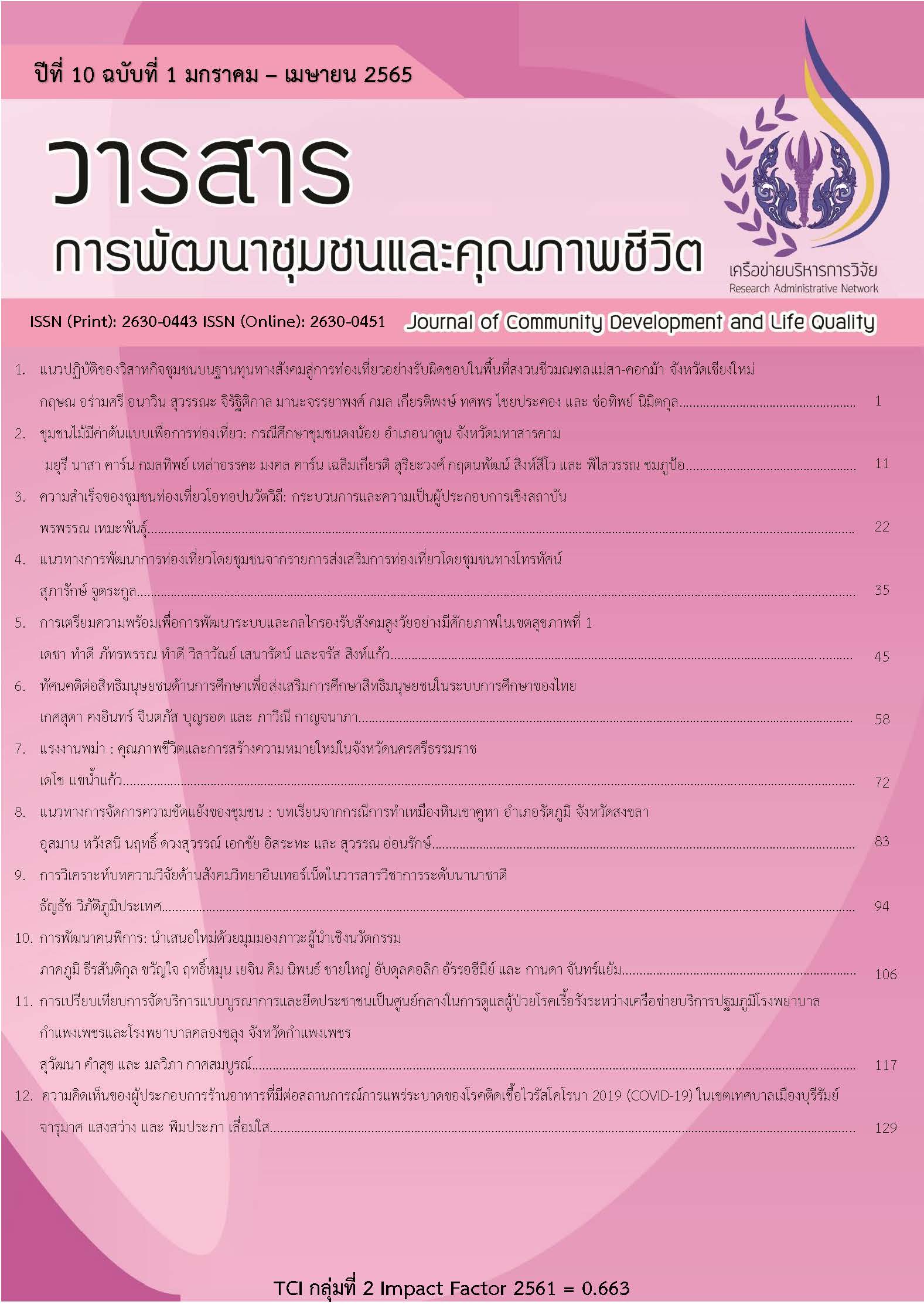ความสำเร็จของชุมชนท่องเที่ยวโอทอปนวัตวิถี: กระบวนการและความเป็นผู้ประกอบการเชิงสถาบัน
Main Article Content
บทคัดย่อ
การวิจัยนี้มี 3 วัตถุประสงค์ คือ 1. เพื่ออธิบายกระบวนการพัฒนาองค์การของชุมชนท่องเที่ยวโอทอป นวัตวิถีต้นแบบในพื้นที่ภาคกลางของประเทศไทย 2. เพื่อค้นหาคุณลักษณะของผู้ประกอบการเชิงสถาบันที่มีผลต่อความสำเร็จของชุมชนท่องเที่ยวฯ และ 3. เพื่อเสนอแนะแนวทางในการพัฒนาศักยภาพชุมชนท่องเที่ยวฯ โดยการประยุกต์แนวคิดการพัฒนาองค์การ ทฤษฎีสถาบัน และความเป็นผู้ประกอบการเชิงสถาบัน เพื่อศึกษาปัจจัยด้านผู้นำที่มีต่อความสำเร็จของชุมชนท่องเที่ยวฯ ต้นแบบ 4 ชุมชน มีผู้ให้ข้อมูลสำคัญ 10 คน ด้วยการสัมภาษณ์เชิงลึก ผลการศึกษาพบว่า ชุมชนท่องเที่ยวฯ มีการพัฒนาผ่านกระบวนการเลียนแบบสถาบันที่มีจุดเริ่มต้นจากแรงผลักดันเชิงการเมืองและวัฒนธรรม โดยผู้นำชุมชนตอบโต้ด้วยกลยุทธ์แบบยอมทำตามเพื่อสร้างความชอบธรรมจากธรรมเนียมปฏิบัติ ซึ่งมุ่งตอบสนองความต้องการของกลุ่มผู้มีส่วนได้ส่วนเสียหลัก คือ หน่วยงานภาครัฐและสมาชิกชุมชน นอกจากนี้ ผู้นำที่มีลักษณะของความเป็นผู้ประกอบการเชิงสถาบัน คือ เปิดโอกาสการมีส่วนร่วม สร้างนวัตกรรมชุมชน และพัฒนาความร่วมมือกับเครือข่ายภายนอก จะสามารถขับเคลื่อนความสำเร็จของชุมชนตนเองได้เป็นอย่างดี ดังนั้น ในการพัฒนาชุมชนท่องเที่ยวฯ ควรเสริมสร้างตรรกะเชิงสถาบันที่มีอยู่และพัฒนาความเป็นผู้ประกอบการเชิงสถาบัน
Article Details

อนุญาตภายใต้เงื่อนไข Creative Commons Attribution-NonCommercial-NoDerivatives 4.0 International License.
กองบรรณาธิการขอสงวนสิทธิ์ในการตรวจและแก้ไขบทความที่เสนอเพื่อตีพิมพ์ในวารสารการพัฒนาชุมชนและคุณภาพชีวิต
บทความหรือข้อความคิดเห็นใด ๆ ที่ปรากฏในวารสารการพัฒนาชุมชนและคุณภาพชีวิต เป็นวรรณกรรมของผู้เขียนโดยเฉพาะคณะผู้จัดทำไม่จำเป็นต้องเห็นด้วย และไม่ใช่ความรับผิดชอบของมหาวิทยาลัยและคณะผู้จัดทำ / บรรณาธิการ
เอกสารอ้างอิง
Battilana, J., B. Leca and E. Boxenbaum. 2009. How actors change institutions: Towards a theory of institutional entrepreneurship. The Academy of Management Annals 3(1): 65-107.
Berente, N., K. Lyytinen, Y. Yoo and C. Maurer. 2019. Institutional logics and pluralistic responses to enterprise system implementation: A qualitative meta-analysis. MIS Quarterly 43(3): 873-902.
Bushe, G. R. and R. J. Marshak. 2009. Revisioning organization development: Diagnostic and dialogic premises and patterns of practice. Journal of Applied Behavioral Science 45(3): 348-368.
Bushe, G. R. and R. J. Marshak. 2016. The dialogic mindset: Leading emergent change in a complex world. Organization Development Journal 34(1): 37–65.
Claymone, Y. and W. Jaiborisudhi. 2019. An Analysis of One Tambon One Product (OTOP) Project: Problems,obstacles, achievements. International Journal of East Asian Studies 23(2): 172-192. (in Thai)
Community Organizations Development Institute. 2017. Preparation for moving forward community-based tourism in the central and west regions in collaboration with tourism association and Ban Pracharat housing project. (Online). Available: https://ref.codi.or.th (October 4, 2021). (in Thai)
Covaleski, M. A. and M. W. Dirsmith. 1988. An institutional perspective on the rise, social transformation, and fall of a university budget category. Administrative Science Quarterly 33(4): 562-587.
Department of Community Development. 2018. Handbook of OTOP tourism village management. (Online). Available: http://www.oic.go.th/
FILEWEB/CABINFOCENTER3/DRAWER051/GENERAL/DATA0000/00000042.PDF (March 12, 2021). (in Thai)
Dorado, S. 2005. Institutional entrepreneurship, partaking, and convening. Organization Studies 26(3): 385-414.
Garud, R., C. Hardy and S. Maguire. 2007. Institutional entrepreneurship as embedded agency: An introduction to the special issue. Organization Studies 28(7): 957-969.
Goodstein, J. D. 1994. Institutional pressures and strategic responsiveness: Employer involvement in work-family issues. The Academy of Management Journal 37(2): 350-382.
Hemaphan, P. and C. Mahakanjana. 2017. Determinants of stakeholder participation towards sustainable tourism development: An empirical study of active beach destinations in Thailand. Sripatum Review of Humanities and Social Sciences 17(1): 103-114.
Kanokhong, Kangsadan. 2018. A guideline for development and management of organic vegetable community Enterprise network in Chiang Mai province. Journal of Community Development and Life Quality 6(2): 261-270. (in Thai)
Kongkhum, S. 2018. Social capital on sustainable community management: A case study of Bannbonamsub community, Moo 1, khuntalae sub-district, Lansaka district, Nakhon Si Thammarat province. Veridian E-Journal, Silpakorn University 11(2): 1727-1743. (in Thai)
Ministry of Tourism and Sports. 2020. Tourism statistics of Thailand during 2015 – 2019. (Online). Available: https://www.mots.go.th/more_news_new.php?cid=618. (May 6, 2021). (in Thai)
Oliver, C. 1991. Strategic responses to institutional processes. The Academy of Management Review 16 (1): 145-179.
Phonginwong, R., K. Huadsir, C. Thipaksorn, K. Eaimviriyawat and R. Sawangtap. 2019. Factors affecting the success of the Inno–Life tourism-based communities: A case study of Bannmai village, Sawai Chik sub-district, Mueang District, Buriram province. Academic Journal of Buriram Rajabhat University 11(1): 117-131. (in Thai)
Sanprasit, W. 2017. The success factors of OTOP. Journal of Information 16(2): 147-158. (in Thai)
Songsom, Anuwat. 2020. Creation of social network and applying sufficiency economy philosophy toward balanced scorecard of small and medium enterprises in Songkhla province. Journal of Community Development and Life Quality 8(1): 206–213. (in Thai)
Thai PBS. 2019. Unlocked hidden story: The end of tourism village. (Online). Available: https://news.thaipbs.or.th/content 283872 (October 2, 2021). (in Thai)
Thornton, P. H., W. Ocasio and M. Lounsbury. 2012. The Institutional Logics Perspective: A New Approach to Culture, Structure and Process. UK: Oxford University Press.
Vareesomboon, L. and N. Sungrugsa. 2018. Good practices in management of the Benjarong of Donkaidee community entrepreneurs, Tambon Donkaidee, Amphoe Krathumbaen, Samutsakhon Province. Veridian E-Journal, Silpakorn University 11(2): 3465-3481. (in Thai)
Waentip, C. and K. Pilun. 2016. Factors effecting the success and failure of OTOP fabric and clothing of Suwannaphum district, Roi-et province. Journal of Politics and Governance 6(1): 66-81. (in Thai)
Wijen, F. and S. Ansari. 2007. Overcoming inaction through collective institutional entrepreneurship: Insights from regime theory. Organization Studies 28(7): 1079–1100.
Worley, C. G. and A. E. Feyerherm. 2003. Reflections on the future of organization development. The Journal of Applied Behavioral Science 39(1): 97-115.
Yamkeep, Ratchapon. 2021. Art and culture capital for spatial development of Plai Bang, Nonthaburi ecotourism and cultural community enterprise 9(2): 300-308. (in Thai)
Zucker, L. G. 1987. Institutional theories of organization. Annual Review of Sociology 13: 443-464.


